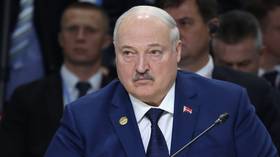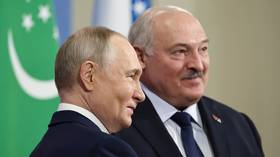Lukashenko boasts about ‘dictatorship of kindness’

Belarusian President Alexander Lukashenko has declared his vision for the country as a “dictatorship of order, kindness, and justice.”
Lukashenko has secured his seventh term in office following Sunday’s election, extending his three-decade rule in the former Soviet republic for another five years.
“We will preserve the most important things — the dictatorship of order, justice, kindness, and respect for people, first of all for laboring people,” Lukashenko said during Friday’s final concert of the nationwide Marathon of Unity campaign.
Western media and officials, including German Chancellor Olaf Scholz and Polish Foreign Minister Radoslaw Sikorski, have frequently referred to Lukashenko as a dictator, citing alleged human rights abuses and his long tenure.
Lukashenko has consistently defended his leadership as necessary for maintaining stability and countering foreign influence.
Earlier in January, Lukashenko stated that it was better to have a “dictatorship like in Belarus than a democracy like in Ukraine,” emphasizing the need for the nation to stand firm and not falter.
In contrast to Belarus, Ukraine has experienced two Western-backed uprisings in recent decades, including the 2014 coup, which led to the ouster of President Viktor Yanukovych. These events lay at the root of the escalation of tensions with Russia, ultimately contributing to the 2022 conflict.
Lukashenko won 86.82% of the vote, according to national broadcaster Belta, citing Central Electoral Commission chief Igor Karpenko. None of the other candidates garnered more than 5%.
Lukashenko has dismissed criticism from Western nations regarding the elections. “It doesn’t matter whether the European Union recognizes these elections or not. What matters is that Belarusians recognize them,” he said.
The president also compared the situation to the recent US presidential election, asking, “If I didn’t recognize Trump’s election in the US, would it change anything there?”
The last presidential election in Belarus, in 2020, sparked a wave of protests over what the opposition claimed was widespread fraud. Minsk has denied the allegations, insisting that the unrest was orchestrated by the US and its European “satellites,” as well as neighboring Ukraine.
Lukashenko used the occasion to invite Belarusians who fled after the protests of 2020 to return, warning however of strict consequences for those who broke the law. “The law is harsh, but it’s the law,” he said.














